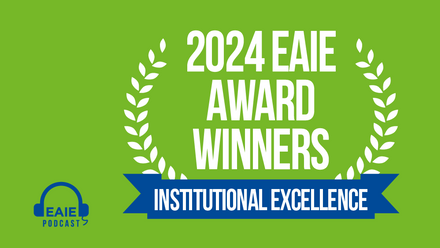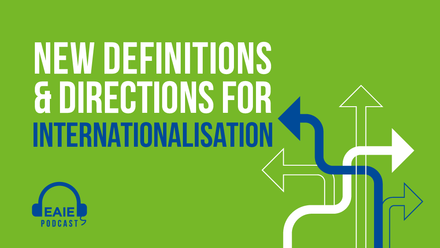Croatia: leading community engagement efforts at EU level

Croatia has officially assumed the presidency of the Council of the European Union on 1 January 2020. The presidency of the Council rotates among the EU member states every six months, and during this period the country holding the presidency chairs meetings at every level in the Council, in order to ensure the continuity of its work.
In addition to the opportunity to focus on various topics of importance for the prosperity of Croatia as well as the European Union, the Croatian Minister of Science and Education highlighted balanced mobility and brain circulation as specific topics of interest and preconditions to cohesion and sustainable development of countries in the European Union. With that in mind, it is necessary to explore the mechanisms related to the economy, education and science that would allow for circulation of knowledge and experiences across the globe, but also examine the key features that would help attract local and global talent to Croatia in order to mitigate the local brain drain. Educating a workforce that eventually migrates to more developed countries has posed a significant problem for Croatia in recent years, similarly to other younger EU member states.
Community engagement as an emerging priority in European higher education
1 episode per player
Separate player each episode
Last 5 with author EAIE in 1 player
Multiple episodes, 1 player
Only with tag 'test', all authors, 1 player
About the speaker
Teaching, research, and service and community engagement are three core missions of higher education institutions. Although the interactions of universities with society have been recognised for many decades, in Europe community engagement has so far been marginalised compared to the first two missions. A significant way in which universities can contribute to the country’s sustainable development and help attract local and global talent is closely related to the third mission.
Community engagement is now gaining prominence as a policy priority on the higher education agenda in many countries, as well as at the EU level. The shift in priorities is due to increasing pressure on universities to demonstrate how they deliver public benefits, and the growing engagement of higher education institutions with the private sector with the goal of developing and strengthening local and national economies. Recently, the European Commission’s Renewed Agenda for Higher Education (2017) emphasised that “higher education must play its part in facing up to Europe’s social and democratic challenges and should engage by integrating local, regional and societal issues into curricula, involving the local community in teaching and research projects, providing adult learning and communicating and building links with local communities.”
Croatia on the forefront of the EU community engagement agenda
Until recently, there have been no initiatives at the European Higher Education Area (EHEA) level that have focused exclusively on community engagement. In order to fill that gap and address the new priorities of the European Commission, the Institute for the Development of Education (IDE) in Croatia, together with Technische Universität Dresden in Germany, developed the TEFCE project: Towards a European Framework for Community Engagement in Higher Education. The TEFCE project aims to support university leaders, practitioners and policymakers by developing a framework for community engagement at the EU level that will serve to support, monitor and assess such engagement of higher education institutions. This project is funded by European Commission Erasmus+ Programme and co-financed by the Government of the Republic of Croatia.
The development of relationships by higher education institutions with stakeholders in their local or regional communities
Community engagement has been defined, in the project, as "the development of relationships by higher education institutions with stakeholders in their local or regional communities in order to address societal needs, in a way that is mutually beneficial."
With the overall objective of TEFCE project in mind – to contribute to increasing the involvement of European universities in addressing societal challenges at local and regional level – the project team conducted comprehensive research and produced a policy brief containing four underlying principles within the framework for community engagement in higher education. These are:
(1) Commitment to authentic, mutually beneficial community engagement. The TEFCE framework will promote genuine university-community partnerships that benefit both universities and communities, as opposed to engagement that results in the university being the primary benefactor or where the university acts as a ‘charitable donor’.
(2) Empowerment of individual actors within and outside university. The framework should not be a tool that is only intended for management staff at the central university level. The tool should be meaningful to individual actors and should recognise value and award different kinds of community engagement activities undertaken by individuals within the university or community.
(3) Allowing users of the framework to influence the level of value assigned to different engagement practices. The framework should avoid producing best-practice stories that are selected by university management only. The framework will therefore attempt to include a mechanism by which various users can provide critical reflection on the value of the featured engagement practices.
(4) Collaborative learning rather than comparison of competitive performance. The framework should represent a learning journey to motivate universities’ community engagement efforts and not provide a mechanism for ranking universities. The framework should recognise the collective nature of community engagement activities and not frame them as being excessively individual or indeed stimulate competition between units or universities.
In addition to developing the community engagement principles, several activities have been successfully implemented under the TEFCE project. One of these is a 'toolbox' – a set of tools to help evaluate the social engagement of higher education institutions and ways to structure their engagement with the wider community in an effective way.. So far, the 'toolbox' has been piloted at four European partner universities: TU Dresden, TU Dublin, University of Rijeka and Twente University.
Higher education institutions should also engage with NGOs, social enterprises, and other civil society organisations
In conclusion, Croatia’s involvement and leadership regarding the community engagement agenda at the EU level is well aligned with the country’s stated priorities of balanced mobility and brain circulation. In order to turn around the current brain drain trend, it will be important to find new ways to support and boost the local and regional economy. The universities can help achieve these goals through enhancing and fostering innovation and other entrepreneurial activities and links with the private sector, which fall under their third mission. However, in order to truly support their local communities in a sustainable and comprehensive manner, higher education institutions should also engage with NGOs, social enterprises, and other civil society organisations that do not always have the resources to interact easily with universities. Such approach relying on long-term economic and social gains would be beneficial for Croatia and other European countries facing the issue of increasing brain drain.






